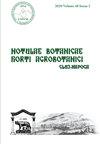氮在植物盐度胁迫中的关键作用:综述与展望
IF 1.3
4区 生物学
Q3 PLANT SCIENCES
引用次数: 0
摘要
盐胁迫是一种严重影响作物生长发育的非生物胁迫。矿物质营养补充被认为是减轻盐度不利影响的有效策略。氮(N)是植物所需的重要营养物质,其施用也是减轻盐度不利影响的有效策略。盐胁迫干扰了植物的生理生化功能、抗氧化活性、细胞膜、抗氧化活性和养分吸收,从而导致植物生长发育显著降低。氮的施用维持了膜稳定性、植物水分关系、叶片气体交换特性,并保护植物免受氧化损伤,从而诱导植物耐盐。此外,氮素还能促进养分吸收,并诱导细胞信号传导,减轻盐度的不利影响。因此,了解氮在诱导植物耐盐性中的作用是很有意义的。本文讨论了盐碱条件下植物对氮的吸收和同化机制。本文综述了氮如何减轻植物离子毒性、氧化损伤和维持营养平衡以对抗盐胁迫的毒性效应。本文的综述将有助于读者进一步了解氮在诱导植物耐盐性中的作用。本文章由计算机程序翻译,如有差异,请以英文原文为准。
The critical role of nitrogen in plants facing the salinity stress: Review and future prospective
Salinity stress is a serious abiotic stress that negatively affect the crop growth and development. Mineral nutrient supplementation is considered as an effective strategy to mitigate the adverse effects of salinity. Nitrogen (N) is an important nutrient needed for plants and its application also an effective strategy to mitigate adverse impacts of salinity. Salinity stress disturbs plant physiological, and biochemical functions, antioxidant activities, cellular membranes, antioxidant activities and nutrient uptake thereby cause significant reduction in plant growth and development. The application of N maintains membrane stability, plant water relations, leaf gas exchange characteristics, and protect the plants from oxidative damages which induce the salt tolerance in plants. Besides, this N also improves nutrient uptake and it also induce cellular signaling that mitigate the adverse impacts of salinity. Therefore, it is interesting to understand the role of N in inducing salt tolerance in plants. In present review the mechanisms of N uptake and assimilation in plants under saline conditions are discussed. The present review provides information on how N mitigates ionic toxicity, and oxidative damages and maintains nutrient balance to counter the toxic effects of salinity stress in plants. This review will help the readers to learning more about the role of N in inducing salt tolerance in plants.
求助全文
通过发布文献求助,成功后即可免费获取论文全文。
去求助
来源期刊

Notulae Botanicae Horti Agrobotanici Cluj-napoca
PLANT SCIENCES-
CiteScore
2.70
自引率
0.00%
发文量
118
审稿时长
3 months
期刊介绍:
Notulae Botanicae Horti Agrobotanici Cluj-Napoca is a peer-reviewed biannual journal aimed at disseminating significant research and original papers, critical reviews and short reviews. The subjects refer on plant biodiversity, genetics and plant breeding, development of new methodologies that can be of interest to a wide audience of plant scientists in all areas of plant biology, agriculture, horticulture and forestry. The journal encourages authors to frame their research questions and discuss their results in terms of the major questions of plant sciences, thereby maximizing the impact and value of their research, and thus in favor of spreading their studies outcome. The papers must be of potential interest to a significant number of scientists and, if specific to a local situation, must be relevant to a wide body of knowledge in life sciences. Articles should make a significant contribution to the advancement of knowledge or toward a better understanding of existing biological and agricultural concepts. An international Editorial Board advises the journal. The total content of the journal may be used for educational, non-profit purposes without regard to copyright. The distribution of the material is encouraged with the condition that the authors and the source (Notulae Botanicae Horti Agrobotanici Cluj-Napoca or JCR abbrev. title Not Bot Horti Agrobo) are mentioned.
 求助内容:
求助内容: 应助结果提醒方式:
应助结果提醒方式:


